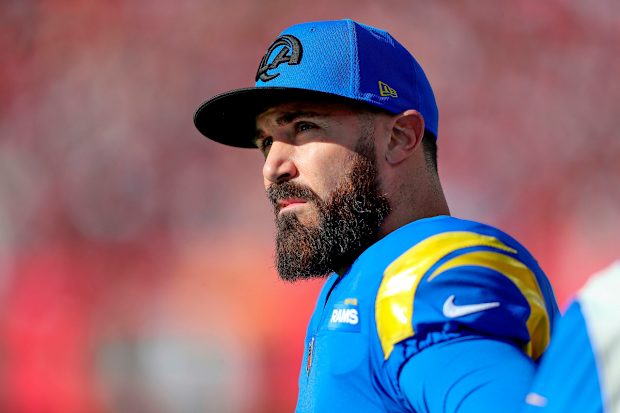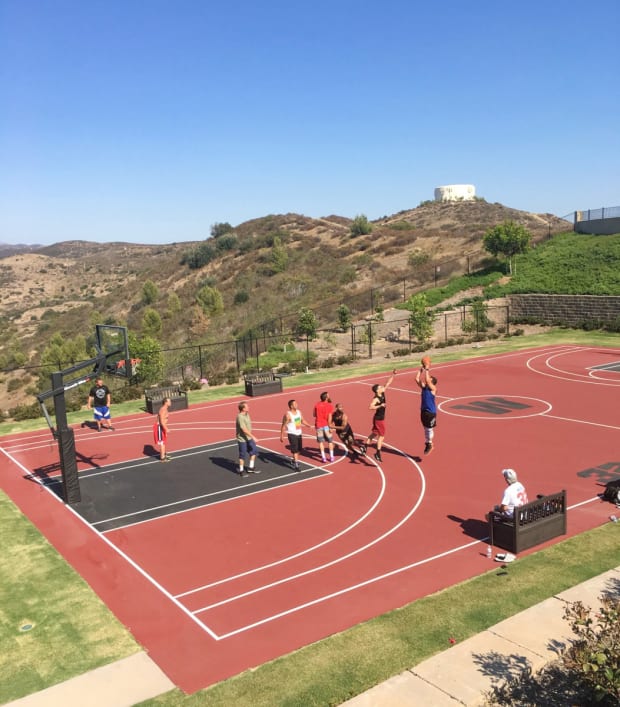The pickup games featured roughly 14 regulars. They ranged from 35 to 45, a group of middle-aged hoopers dribbling and defending in an attempt to ward off expanding midsections, achy backs and father time. They tipped off on Wednesday nights in suburban San Diego, descending to the red court with white lines and black keys and a view of rolling hills. They played five-on-five, full court, under the lights.
During the day, the participants worked as high school football and basketball coaches, helped run a college athletic department, sold insurance, filled out tax returns and operated a Sticky Chicken food truck. One man connected all of them, two years into his easy, comfortable, borderline idyllic “retirement,” the one that followed a lucrative, celebrated and regularly painful 13-year career. He had retired late, at least for his profession, and retired early, in his mid-30s. He did not struggle with the transition, nor lament what he left behind. “Loved every second of it,” he says.

Kirby Lee/USA TODAY Sports
He went to church. Slept in. Made breakfast for the family. Packed school lunches. Spent time he could hardly find before with his wife and four children, ages 8 to 14. When the kids went to school, he hit the gym—not as hard as he used to, but still lifting every day and running twice a week. He dabbled in coaching, too, becoming an assistant for a 12-and-under youth football team while eying a high school gig. He looked forward to watching NFL games, but loosely, as a fan. He always made sure to catch the two teams he knew the best and rooted for the hardest: the Ravens and Rams. And, as part of his new life, his new routine, he ferried the children all over San Diego, to school and sporting events and social endeavors. He drove them so often, to so many places, that he began to refer to that exercise as the Weddle Taxi Service.
Because he was busy—coaching, hooping, driving—and fulfilled, he hardly paid attention to the endless news generator that is the NFL. Because he didn’t look at the game he loved beyond the games he watched, he didn’t notice the defensive conundrum the latter part of the 2021 season presented to the Rams. Despite regular contact with Sean McVay and others, he wasn’t aware that their depth at safety was depleted. He didn’t see that L.A. had lost team captain Jordan Fuller for the remainder of the season to a right ankle injury in Week 18 or that Taylor Rapp had entered concussion protocol as the postseason began.
In fact, the call that changed his life, altered the NFL postseason and helped the Rams return to the Super Bowl came as a complete surprise. That afternoon in January he visited Rancho Bernardo High School, where a close friend planned to retire as the school’s football coach in the next few years. He wanted the position and met with the athletic director for two hours. “It was awesome,” he says.
As he left the meeting, he considered the possibilities. His children would be older when the job opened, the gig appealed to him and the combination would provide the perfect transition into his next life. His phone buzzed right then. It was Raheem Morris, a friend, mentor and the Rams’ defensive coordinator. They hadn’t spoken in a few months. When he didn’t pick up, Morris sent a text. Hey, Dub, give me a call when you get this. He couldn’t figure out the urgency. Maybe Morris wanted to ask him about the team’s next opponent, the Cardinals? But he hadn’t watched them in recent weeks and knew little about their season. And this was six days before the wild-card playoff game. The scouting would mostly have been completed by then.
At 3:30 p.m., he returned the call. After some small talk, the usual pleasantries, Morris got right to the point. “Eric Weddle,” he said, “you’re not fat and out of shape, are you?”
“Of course not,” Weddle answered. “You know that’s not how I am; you know that” he said.
“I figured that; I just wanted to ask,” Morris said. “So, listen here, we’ve got this crazy idea …”

Alex Menendez/AP/Shutterstock
The purpose of the call clicked for Weddle. Morris didn’t want his analysis of the Cardinals’ offense. He wanted Weddle—an NFL safety for 13 seasons, part of the Rams family even in retirement and the host of the Sticky Chicken guy for informal basketball games—to return to the game he left, and to the last team he had played for, immediately.
Morris explained his depth conundrum. “I’m just throwing this idea out,” he said. “I was wondering: Could you give us 10 to 15 snaps on Monday night?”
Weddle blurted out his response, all but shouting the first thought that entered his mind. “Are you insane right now?” he asked. “I’m literally the best option you guys can think of?”
“Yes,” Morris told him. “We’re serious. We started discussing this a few weeks ago. Think about it.” (A Rams source confirmed that the team first discussed adding Weddle as an “emergency” option while confronting a COVID-19 outbreak in mid-December. Weddle was unaware of those discussions.)
Weddle did consider it. On one hand, he wasn’t in “football shape.” He no longer weighed 195 pounds, his playing weight for six Pro Bowl campaigns and an illustrious career with the Chargers, Ravens and Rams. Plus, the defensive system Morris had installed after being named the defensive coordinator last winter was different from the one that Weddle played in during his final season, 2019. But Morris had made some good points. Weddle was smart, “only” 37 and in shape.
Weddle kept thinking, all afternoon and into the evening. Could he physically handle the task? Would it diminish the legacy he created? And, if it did, could he handle “going out there, flopping, being a bust and people laughing?”
Despite how much he loved “retirement,” the pandemic had been rough. He had retired in February 2020, before the schools shut down. He became one-half of a home teaching tandem, everyone stuck inside, the parents struggling to explain the new common core math curriculum taught in local schools and the kids, like most kids then, straining to remain on task. But life in the Weddle household had stabilized when the children returned to regular classrooms in January ’21. The family took ski trips to their house in Salt Lake City. They traveled. The Weddle Taxi Service reopened. Business was booming. He hadn’t once thought, while watching an NFL game, I’d fit well there, or I could still play with these guys.
“When I [watched earlier this season], it was as if I never played,” he told Sports Illustrated on Wednesday night. “It’s hard to imagine that I did that. Honestly, at times on Sundays, it was almost like [my career] was a long dream, and we were back to reality and it never happened. As [wild] as that sounds, that’s just how I view myself. I never dreamed of playing in the NFL growing up. I thought those guys were mythical beings.”
On that fateful Tuesday afternoon in January, Weddle continued to gauge whether he could rejoin them. He took one daughter, Brooklyn, to volleyball practice; delivered one son, Gaige, to a basketball workout; then picked them up in reverse order. The four hours he spent driving allowed for time to think and to make phone calls.
He dialed his wife, Chanel, and asked, “Hey, what would you say if I told you that on Monday night I could possibly be playing for the Rams?” She thought he was joking at first and started laughing. When he explained further, she told him, “Babe, if anyone can do it, you can.”
Weddle started to warm to the Rams’ plan. He buzzed Coach E, or Ejiro Evero, who coordinated the defense’s passing scheme. They discussed his knees and how much they had healed in the two years that Weddle didn’t play.
He phoned Jalen Ramsey next, because he wanted to know how he might fit in the new defense, arriving after an 18-week season. Weddle didn’t want to “mess anything up.” Was the All-Pro cornerback on board? “Dub, this would be the best Christmas present in the history of the world!” Ramsey gleefully told him. Weddle tried to press Ramsey for more details, but Ramsey cut him off. “Eric, stop talking,” he said. “Get up here. I need you.”
Finally, Weddle dialed McVay. The coach wanted him to return as badly as anybody, and yet, he didn’t try to persuade Weddle, because he didn’t want Weddle to make an emotional decision based on their friendship.

Allen J. Schaben/Los Angeles Times/Getty Images
The combination of calls led to a revelation, a life—and how it fit into a team’s season—considered, analyzed and processed in a handful of hours. Weddle always told his own children and the players he coached to exist in the moment and seize the opportunity. How could they respect him if he didn’t do the same himself? “I want to live without regret, and I didn’t want to not take the chance of a lifetime,” Weddle says. “That’s how I live, that’s how I love, that’s how I care. I just couldn’t look at myself if I didn’t take this chance.”
Weddle drove home that evening, his mind already made up. There would be no pickup basketball game that Wednesday night. Instead, a football player who had left football behind would lean on the characteristic that defined his career to make a comeback, to pull a Favre. “I’m one of the most mentally tough dudes in the world,” Weddle says. “I love challenges. And I love the fact that everyone’s going to think I’m crazy, that they’re going to think the Rams are crazy and that we get the chance to do it right.”
The Rams set him up in a hotel near team headquarters in Thousand Oaks. Weddle left his family at 10:30 p.m., pulled into the hotel parking lot around 1 a.m. and went to bed. Then, over the next three weeks, he worked “as hard as I ever have.”
Learning the system wasn’t difficult, not for a player like Weddle, who is cerebral, can process information quickly and was familiar with most every defensive scheme in existence from his first 13 seasons. He simply needed to apply the new verbiage to what he already knew. He practiced for the first time that Thursday and didn’t make a single mistake in terms of positioning or checking calls before the snap.
He loved everything about the reunion. The hugs and handshakes. The time spent in the sauna, as teammates made jokes about his familiar white pickup truck pulling into the parking lot before most everyone else arrived. He loved the energy and excitement and how the Rams had evolved in his time away. They were coming off a brutal loss to the 49ers in the regular-season finale—their sixth straight defeat against their NFC West nemesis—and they had squandered a late lead. But they exuded calm, which spoke to that evolution. McVay in particular seemed looser, more comfortable as a head coach, which heightened the team’s confidence. There were new faces, like Von Miller and Odell Beckham Jr., along with familiar ones, like Ramsey, Aaron Donald and Cooper Kupp.

Weddle spent much of that Monday night shadowing Zach Ertz, the Cardinals’ tight end with a six-inch, 50-pound size advantage. Weddle played 19 snaps. The Rams won easily, and he celebrated by watching film with Kupp. The next week, at Tampa in the divisional round, Weddle registered 61 snaps and made four tackles. Last weekend, in the NFC championship game, he trotted onto the turf for 51 more plays and led the Rams in tackles, with nine, as the movie that was real life continued. His fourth-quarter takedown of running back Elijah Mitchell helped force the punt that preceded the game-tying Rams drive.
His return also birthed unintended but related bonuses. He wasn’t banged up; normally, by late January, his body would be bruised and beaten down from a long season. He provided leadership. He didn’t need to hold back anything and could put all his energy, focus and attention toward the Super Bowl berth he tipped the franchise toward. He had done everything an NFL player can do except win a championship, and as the Rams won and advanced, the realization started to sink in: Now, he could even do that.
Teammates marveled at his play over the past three weeks. They didn’t see any drop-off in performance. McVay cited Weddle as an “igniter,” the kind of player they could build a run around, a safety who gave them a better chance to win the game they lost four seasons ago. “He’s so smart,” Donald told reporters.
“The mind is a powerful thing,” Weddle says. “I’ve always told myself, ‘You can do anything if you’re all in,’ and, shoot, I’ll be starting in the Super Bowl in 10 days.”

Courtesy of Eric Weddle
Weddle even re-created weekly events from his previous tenure. Perhaps he needed the same fix he got from those pickup basketball games on Wednesday nights. In his return to L.A., with close friend and Rams left tackle Andrew Whitworth, he cohosted what they call Dinner Club, which met on Thursdays, the participants younger than the hoopers, except for Whitworth and Weddle himself. They had food catered and took turns paying the bill. And they dreamed the same dream: of confetti, of a title, of the winding nature—Weddle back, Whitworth to face his old team, the Bengals, in LVI—of their work.
With the Super Bowl fast approaching, Weddle hasn’t taken a lot of time to consider the past month of his life. He’ll have plenty of time to do that afterward and holds no plans to return for the 2022 season. Still, what reflection he has allowed led him toward cosmic concepts, like fate, his career—from meeting Morris at the Senior Bowl in ’07 and discussing their shared hope that they “would cross paths at some point,” to landing with the Ravens after they won another Super Bowl, to “finishing” his career with the Rams in ’19 to toppling the Niners in his return—completing a full circle. “All those things have brought me to the point where I’m in the freakin’ Super Bowl,” he says. “And you just think it’s meant to be, for whatever reason, to help these guys in this moment and be part of something special.”







